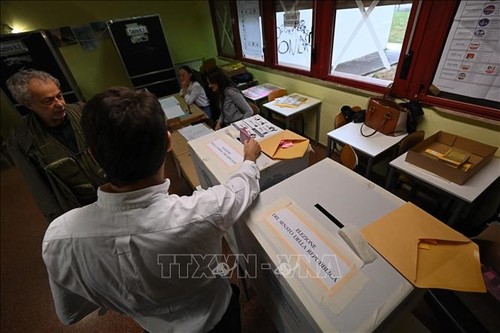 Voters cast their ballot at the early elections in Rome, Italy, on September 25, 2022. (Photo: AFP/VNA) Voters cast their ballot at the early elections in Rome, Italy, on September 25, 2022. (Photo: AFP/VNA) |
Italy's early general election was held two months after Prime Minister Mario Draghi was forced to resign in July. A right-wing coalition led by the Brothers of Italy (FDI) party won a majority in both Houses. The center-left coalition led by the Democratic Party conceded defeat and will be the largest opposition force in the Parliament. This is a fundamental change in the balance of forces, which means profound adjustments in economic and diplomatic policies are coming.
Notable changes
Analysts say the election results were predictable after Prime Minister Mario Draghi and his cabinet resigned. Polls prior to the election showed the same result, a clear victory for the center-right coalition.
The right-wing coalition will form the Government and have control over both houses of Parliament. It is very likely that Giorgia Meloni, the leader of the FDI, will become Italy’s first female Prime Minister.
Italy has had 43 Prime Ministers since World War II and it will now have its 4th government in 4 years.
The public’s greatest concern is the serious socio-economic difficulties that Italy and the EU are facing due to soaring food and energy prices since the outbreak of the Russia-Ukraine conflict. A shift in Italy’s leadership at this point is worrisome for Europe.
EU’s concerns
Analysts say there are reasons for the EU to be concerned.
First, Italy has benefited the most from the EU’s 2021 COVID-19 support package worth 750 billion euros. The effectiveness of the support package for Italy will affect the overall success of the package. During the election campaign, Giorgia Meloni repeatedly advocated abandoning EU regulations on budget discipline (annual deficit of no more than 3% of GDP and public debt not exceeding 60% of the total budget).
With the FDI coalition controlling the Italian government, the EU’s policy stability will face additional pressure, beyond the economic challenges brought by the highest inflation in decades.
Second, the FDI has a different view from most EU members of the Russia-Ukraine conflict. Silvio Berlusconi, leader of Forza Italia, and Matteo Salvini, leader of the League of Italy, both oppose the EU tough anti-Russian sanctions. This means EU consensus on handling the Russia-Ukraine dispute will be more difficult.
FDI leaders also have a tough stance on Europe's refugee policies and receiving migrants to Italy. It’s important position on the global migration map, will put pressure on the EU’s strategy.